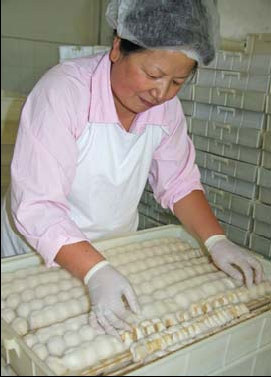Old name, fresh face
Updated: 2012-04-20 08:46
By Xiao Xiangyi (China Daily European Edition)
|
|||||||||||
Another example of a Chinese brand that has altered its business model is silk shop Ruifuxiang. The shop was founded by Meng Luochuan - a descendent of the Chinese thinker Mencius - in 1893 in Beijing. In the beginning of the 20th century, it had grown to become the biggest silk and cloth shop in the capital.
|
 Fermented bean curd maker Wangzhihe now provides a wider range of products. Provided to China Daily
|
But instead of simply providing fabric, the Ruifuxiang store in Qianmen, another shopping street in Beijing, provides a number of choices, from silk scarves, silk quilts, pajamas and qipao (a tight fitted women's dress).
"People are more likely to buy ready-to-wear clothes, so we sell half fabrics and half finished goods," says Wang Qiang, sales and marketing manager of Ruifuxiang. "In order to maintain our tradition and target high-end customers, we have not quit selling the cloth, so we provide new services like tailoring accordingly. After all, Ruifuxiang started off by selling fabric."
The brand's silk quilts are particularly hot items for Chinese customers, who buy them as gifts for the newly married. Tailoring, Wang says, is the company's way of being innovative and also preserving its tradition.
Ruifuxiang once had 106 chains around China in 1927 but not a single chain store remained after the "cultural revolution" (1966-76).
"The chains used to be called lianhao in Chinese tradition, and each chain store was a duplication of the original one with the same standard of commodities and service," says Sun Danwei at Wuyutai, which currently has more than 260 chain stores all over China.
When Wuyutai started to adopt the business model of chain stores in 1997, competitors acted with indifference.
"But we still decided to have chains when I saw more customers coming over from far away to buy tea. That was not only out of consideration of their convenience, but also of reshaping a shop into a well-known brand," Sun says.
More than 300 chain stores are expected within 2012. For years Wuyutai has opened chain stores at a rate of 50 a year at a ratio of one chain store and five franchisees. Total revenue in 2009 was 540 million yuan and 590 million yuan in 2010. Wuyutai achieved a 20 percent year-on-year growth in 2011, Sun says. The biggest challenge for the model is the management of these chains. Sun invited Lenovo to develop a managing information system in 2001.
Pushing and expanding on existing business models have been key for several of these time-honored brands.
"Time-honored brands live longer than others mostly because of the pursuit and insistence of certain core values. Just like the motto of Ruifuxiang says, 'No one will be cheated, no matter the old or the young; no bargaining for the reasonable price,'" Kang says.
Many founders of China's time-honored brands were scholarly businessmen during the feudal times. Since Confucianism had a great influence, they believed in integrity and honesty for their businesses. Unlike Western brands such as Louis Vuitton, Chanel or Hermes, China's time-honored brands did not have a constant market for growth. Wars and the "cultural revolution (1966-76)" brought the economy to a standstill, Kang says. But through it all, some brands have survived.
"That means quality is the soul of a company. China is developing at a high speed and it is a hasty era. If a brand, not only a time-honored brand, wants to become an international reputable brand, it has to be persistent and resolved in pursuing quality," Kang says. "But quality does not mean luxury. Sam Walton's Wal-Mart is not a luxury brand. Even a sewing needle can have the best quality among needles at the same price."
xiaoxiangyi@chinadaily.com.cn
Today's Top News
Rescuers race against time for quake victims
Telecom workers restore links
Coal mine blast kills 18 in Jilin
Intl scholarship puts China on the map
More bird flu patients discharged
Gold loses sheen, but still a safe bet
US 'turns blind eye to human rights'
Telecom workers restore links
Hot Topics
Lunar probe , China growth forecasts, Emission rules get tougher, China seen through 'colored lens', International board,
Editor's Picks

|

|

|

|

|

|





